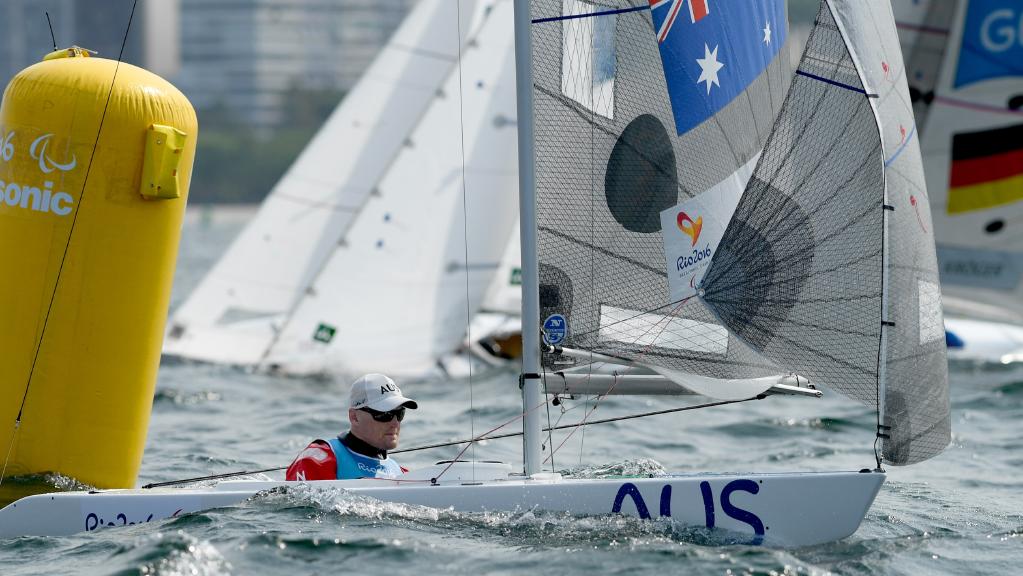

I spoke to Matt Bugg on the subject of mental toughness and psychology in sailing. Matt is a man who has not let adversity stand in his way to achieve great things in our sport.
After becoming a paraplegic in a snowboarding accident at 23, Matthew decided to try to reach the pinnacle of Para-sailing, first in Australia and then internationally sailing the very competitive 2.4-metre single-hander.
He has won National Championships and countless races culminating in a Silver medal at the 2016 Olympic Games in RIO.
Excerpts from that interview are copied below:
I really admire the tenacity you’ve shown to get to where you have in our sport. From a psychological point of view, what have been the toughest challenges you’ve had to face and what did you do to overcome them?
Matt: I think I’ve always been a very natural helmsman and I think that’s because I grew up steering boats from a very young age. Whenever we went cruising on the boat or sailing and whenever I could, I was on the helm. Captain Araldyte that was my name on board “Buggbear”.
I was a good helmsman when I got into sailing but, it had been quite a while since I’d done a lot of really intense racing and I never really sailed at such a high level. So the nuances and the really technical stuff I kind of had to learn all over again when I started sailing 2.4s.
So what has enabled you to reach the heights that you have, has it been mental toughness, and what’s the psychology behind it?
Matt: I think going back to your earlier question and combining the two, probably the biggest psychological hurdle that I had to overcome was sailing in a breeze. When I first started sailing 2.4s, I never really enjoyed sailing in the really windy stuff. You get very wet. It was really loud.
Everything was really loaded up and I just preferred racing when it was light or when it was perfect medium conditions.
I think the most important thing for me in terms of progressing my results because I would always do well in the light stuff and the medium stuff. But if you want to be a really good sailor, and move up to the next level, you really have to embrace heavy air and you have to love it.
That was probably the biggest hurdle in terms of jumping my results forward. I just forced myself to go out there and absolutely love it when it was 20 or 25 knots. And if you love it, you’re going to sail better in it. It’s as simple as that.
So I think that was probably the main thing that took me from a mid-fleet racer to a high-level racer was really embracing the heavy air. Whenever it happens, that’s when the mid guys drop back and that’s when you really have an opportunity to put good races in.
Also, I just read. I read every bit of sailing literature that I could.
Talking about fellow competitors, what’s the best way to view fellow competitors? Do you view them as an enemy or a friend?
Matt: That’s a really interesting one and I think it’s always I try to be friends with them all. There’s no point in having enemies and having people that don’t get on with off the water.
Certainly, when I’m on the water, I treat everyone the same and that’s with a violent hatred basically.
Not when we’re just on the water but, from when the gun goes for the start to the end of the race. While we’re out on the water, I’ll congratulate someone on a good race or a good tactical decision or something. I think respect is really important. But on the land, it’s great if you can make as many mates as possible. Why wouldn’t you?
Was there anything you did to try and improve your mental toughness?
Matt: Music. Hard music. Generally, I’ll try and listen to some “Rage Against the Machine” or some “Tool” especially if it’s going to be windy. I’ll listen to very aggressive music and try to get that music in my head for when I’m out sailing.
What’s the most important psychological thing that the sailor who wants to improve should concentrate on?
Matt: Certainly for me from my point of view, it does come down to real confidence in your preparation.
If you go out sailing on the course knowing that all the guys you’ve been sailing against have just been sailing three or four times a week. You’ve been popping down to the club every second weekend, then mentally you’re starting off behind the 8 ball.
And so you need to really have that confidence that you’ve done as much or more than the guys that you’re going to be racing against. Or you know that you’re faster for some reason.
The other important thing for me, and I’ve always been very lucky, is that I’ve always had a very good team around me. Not everyone is so lucky to have a coach and a sail designer that sort of travels with you to sailing regattas.
You know, even if it’s just you’re quite good friends with a few other guys out of the same fleet as you or out of the same class and you go out and tune up together.
Obviously do a few pre-race tune-ups, a few split tacks, just some basic sort of one-on-one tuning, making sure that your boat’s going fast. That all gives you confidence in your preparation for the time that the start gun goes.
Is there anything that you do personally to keep sailing fit away from the boat?
Matt: In all of my racing, until the Games last year, I was in the gym as much as possible, two or three times a week. Fortunately, my boat didn’t require too much fitness. So it certainly wasn’t the most important thing to me. So I just tried to keep myself fit just so, really that I was mentally fit and so that I wasn’t too heavy for in the boat.
It’s not rocket science. If you need to be fit for the boat, you run and you ride your bike, and the fitter you are, the faster you’re going to go.

